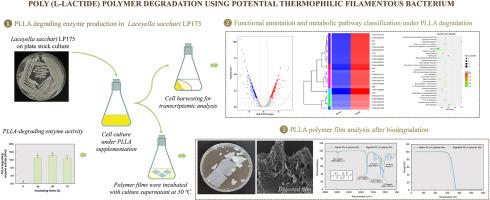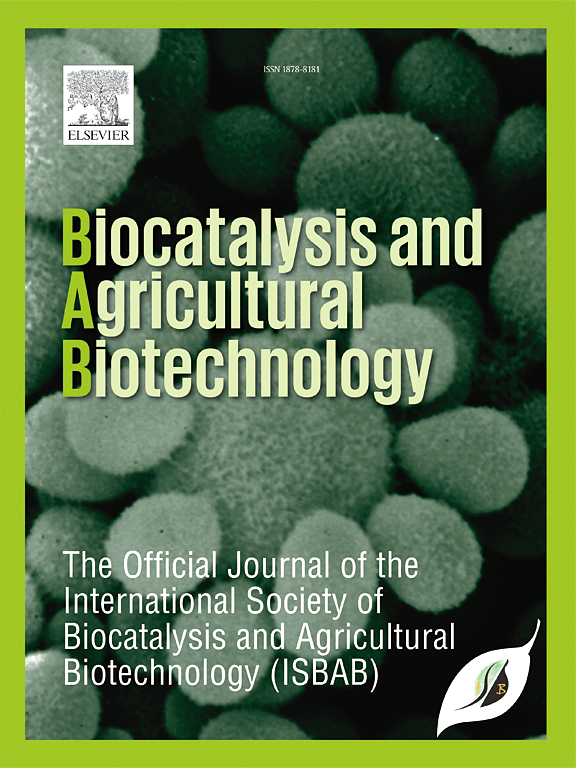嗜热丝状菌 Laceyella sacchari LP175 降解聚(左旋乳酸)聚合物时的转录组图谱分析及其水解聚合物薄膜的潜力
IF 3.4
Q2 BIOTECHNOLOGY & APPLIED MICROBIOLOGY
引用次数: 0
摘要
聚乳酸(PLA)是一种可水解聚合物,可用于医疗器械、农用薄膜和包装材料等多种用途。完全分解可生物降解聚合物的生物方法对环境有益。Laceyella sacchari LP175 是一种嗜热丝状菌,具有产生聚(L-乳酸)(PLLA)降解酶的巨大潜力,其特征是丝氨酸蛋白酶。这项研究表明,在 50 ℃ 的高温下,该菌株能有效降解聚乳酸(PLLA),并在培养的最初 24 小时内提高酶活性。用该菌株的培养上清液培养聚乳酸聚合物薄膜时,聚乳酸聚合物薄膜的物理和结构特征发生了改变,这一点得到了验证。转录组分析揭示了Laceyella sacchari LP175在PLLA降解过程中的差异表达基因,分别显示了289和296个上调和下调基因。研究结果表明,丝氨酸蛋白酶和转运相关基因在囊袋雷氏菌LP175降解聚乳酸的过程中发挥了关键作用。对富集表达基因的功能和代谢途径注释表明,当细胞在聚乳酸粉末存在下生长时,丙酸盐代谢、蛋白质分泌和膜运输是主要的诱导途径。因此,转录组数据将有助于开发和操纵微生物系统,改善生物可降解聚合物的降解。本文章由计算机程序翻译,如有差异,请以英文原文为准。

Transcriptomic profiling under poly (L-lactide) polymer degradation of the thermophilic filamentous bacterium Laceyella sacchari LP175 and its potential for polymer film hydrolysis
Polylactide or polylactic acid (PLA) is a hydrolysable polymer used in many applications including medical devices, agricultural films, and packaging materials. Biological methods that completely decompose biodegradable polymers are environmentally beneficial. Laceyella sacchari LP175, a thermophilic filamentous bacterium, had a high potential producing poly (L-lactide) (PLLA)-degrading enzyme which is characterized as a serine protease. This study demonstrated that this strain is an effective degrader of PLLA at a high temperature of 50 °C, which resulted in an increase in enzyme activity within the initial 24 h of incubation. The alterations in the physical and structural characteristics of the PLLA polymer film were verified to occur when incubated with a culture supernatant of this strain. Transcriptomic profiling revealed the differentially expressed genes of Laceyella sacchari LP175 under PLLA degradation, showing 289 and 296 up-regulated and down-regulated genes, respectively. Findings indicated that serine protease and transport-related genes played a key role in the biodegradation of PLLA in Laceyella sacchari LP175. The functions and metabolic pathway annotation of the enriched expression genes showed that propanoate metabolism, protein secretion, and membrane transportation were the main pathways induced when cells were grown in the presence of PLLA powder. Therefore, transcriptome data will be helpful in the development and manipulation of microbial systems to improve the degradation of biodegradable polymers.
求助全文
通过发布文献求助,成功后即可免费获取论文全文。
去求助
来源期刊

Biocatalysis and agricultural biotechnology
Agricultural and Biological Sciences-Agronomy and Crop Science
CiteScore
7.70
自引率
2.50%
发文量
308
审稿时长
48 days
期刊介绍:
Biocatalysis and Agricultural Biotechnology is the official journal of the International Society of Biocatalysis and Agricultural Biotechnology (ISBAB). The journal publishes high quality articles especially in the science and technology of biocatalysis, bioprocesses, agricultural biotechnology, biomedical biotechnology, and, if appropriate, from other related areas of biotechnology. The journal will publish peer-reviewed basic and applied research papers, authoritative reviews, and feature articles. The scope of the journal encompasses the research, industrial, and commercial aspects of biotechnology, including the areas of: biocatalysis; bioprocesses; food and agriculture; genetic engineering; molecular biology; healthcare and pharmaceuticals; biofuels; genomics; nanotechnology; environment and biodiversity; and bioremediation.
 求助内容:
求助内容: 应助结果提醒方式:
应助结果提醒方式:


